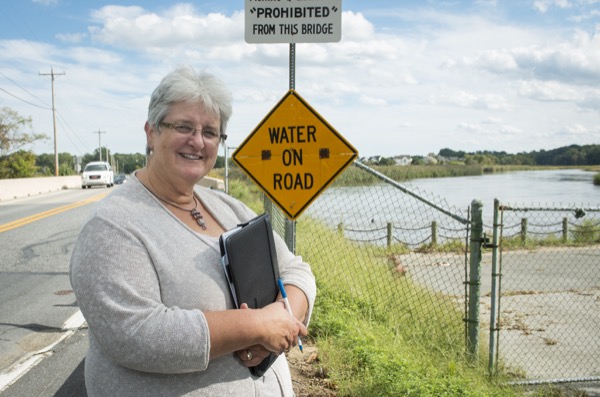McNeil elected distinguished member of American Society of Civil Engineers
Engineering projects don’t happen in a vacuum, and the University of Delaware’s Sue McNeil makes sure her students are aware of the social, psychological, political and economic factors that determine whether and how projects get done.
A professor of civil and environmental engineering, McNeil studies how people make decisions about building, rebuilding, or renewing infrastructure like roads, bridges, and wastewater management systems –and how natural disasters and hazards impact those decisions.
“We’re trying to get engineers to think more broadly about not solving problems as simply engineering problems,” she says. “What are the implications for the system or network that [the project] functions in? Who’s benefiting? Who’s being disadvantaged by this?”
In recognition of her “pioneering contributions to the redevelopment of brownfield sites, for infrastructure management education and research, and for efforts to strengthen diversity in the civil engineering profession,” McNeil has been elected a distinguished member of the American Society of Civil Engineers (ASCE).
The oldest engineering society in the United States, with members in 174 countries, ASCE has bestowed distinguished membership on only 650 people in its 163-year history.
“We are proud of Prof. McNeil’s distinction and all she has done to help our students understand the world in which engineers operate,” says Harry (Tripp) Shenton III, professor and chair of UD’s Department of Civil and Environmental Engineering. “Distinguished member is the highest honor ASCE bestows and the total number of members elected in any year cannot exceed one per 7,500 members. So this is quite an honor for Prof. McNeil, and more importantly it is recognition by her peers of the outstanding work she has done for the profession.”
McNeil, director of the disaster science and management graduate program, held positions at the University of Illinois in Chicago, the University of Minnesota, and Carnegie-Mellon University before coming to the University of Delaware in 2005.
Along with mentoring several graduate students, she teaches the required transportation engineering class for undergraduates, and has won several teaching awards. She was founding chair of the ASCE’s civil infrastructure systems committee, works with the National Academies’ Transportation Research Board, helps run a graduate student research conference, and edits the Journal of Infrastructure Systems.
“We’ve been looking at housing recovery from Hurricane Sandy, and how that impacts decisions to fix infrastructure,” says McNeil. “If people are relocating elsewhere and not rebuilding their communities, you would want to think about making the investments in areas into which they’re moving; if they’re trying to rebuild their community and returning to the residences, then you want to make sure you’ve got the support infrastructure. So we’ve been looking at how household decisions should impact infrastructure decisions.”
McNeil is also working with the Delaware Department of Transportation, studying the quality of the data used to decide whether to repave or fix potholes and pavements. She believes that civil engineers need to consider maintenance costs.
“We spend time teaching how to design and build things,” she tells students, “but one of my objectives is to get you to think about the fact that we’ve got to maintain and operate what we build for a long time.”
“Civil engineers are responsible for the nation’s physical infrastructure,” says McNeil, “which includes issues of aging infrastructure, financing and funding that infrastructure, and risks associated with unexpected events. All together, these create a pretty significant national challenge.”
Concern for social impact extends to her ongoing work to encourage women to pursue civil engineering, driven by her own experience as one of very few women in her field when she was in school. She’s been involved with initiatives aimed at everyone from high school girls to professional women engineers, as well as general initiatives to help students build networks and improve recruitment and mentoring.
“Part of the goal is to make sure that people understand inherent biases,” McNeil says. “What does it take for faculty to go through the tenure process, what do they need to know, how do they build a professional network? Anything we do that applies to women also is of value to everyone else.”
UDaily article | Photo by Kathy F. Atkinson

